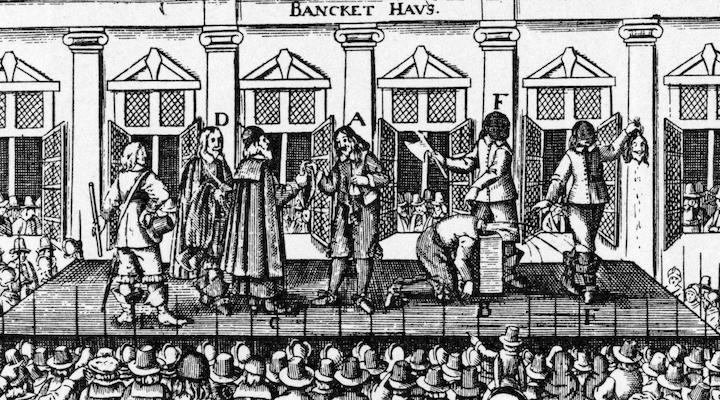

Nov 4, 2025
On 6 December 1648, at the end of the English Civil War, Colonel Thomas Pride and his soldiers stood outside the entrance to St Stephen's Chapel in the House of Commons of England and, as the Commons convened that morning, arrested 45 Members and excluded a further 186 Royalists. It is known in history as "Prides Purge". The remaining members of parliament, called the rump parliament, then tried Charles I for high treason and found him guilty for crimes against the British People. The King of England was executed on January 30th 1649, beheaded in public in front of Whitehall as Oliver Cromwell and thousands of others looked on. The identity of the executioner, hidden in a hood, wig, and grotesque fake beard, is still officially unknown but is herein identified as the adolescent son of Colonel Pride, Joseph Pride. In 1661 he became a Pioneer of Prides Corner Maine as a fugitive fleeing the vengeful kings son, King Charles 2nd.
In 1658, after ten years of Puritan rule, Colonel Pride, then a member of the House of Lords died. Two years following his death, the English Restoration of the Monarchy made King Charles's son King Charles 2nd. Colonel Prides body was ordered dug up and posthumously executed, suspended on the gallows at Tyburn along with those of Oliver Cromwell, Henry Ireton and John Bradshaw, though it is said that the sentence was not carried out because his corpse was too far decayed. The Royalists thereupon attempted to hang his son Joseph Pride, who barely escaped.
According to an oral history the escape from the Kings men had a dramatic and ironic twist.
Red Coats hot on his heels,... Joseph ran down a hill, out a dock, and dove into the sea and swam to a longboat that had already departed the Dock. Purely by luck, it was the last longboat to the ship which was setting sail to the New World and he got away.
The oral history also stated that every Generations first born that followed was named Joseph in honor of the unsung puritan hero, the executioner of the hated and tyranical King, King Charles 1st.
Clip ends with her fondness of 'debauchery'.
Great effort was taken to hide the identity of the executioner. Many guesses were later made, most naming prominent puritans like Hugh Peters. But all were accounted for. Soldiers lined the platform to obscure the view, the executioner was obviously somebody they wanted to protect. The executioner wore a wig and a grotesque fake beard. The executioner held the head aloft but flubbed his lines and did not say the traditional "behold the head of a traitor", and then unceremoniously dropped the king's head into the crowd (two strong indicators of inexperience). The fake beard, the total silence, and the flubbed performance may support the story further. From the evidence we have, Joseph was still a boy in 1649 and it may have been necessary to hide his lack of a beard to avoid recognition as well as his childs voice. His actual birth date is unknown, but the limited evidence we have vaugely suggests he was around 12 or 13 years old in 1649, and not the super skilled executioner favorites such as Anne Boleyn got and bragged about. Was this just a measure of thier contempt for Charles 1st? The 200,000 deaths of Charles 1st were Maces bashing heads in, swords slashing throats, blood and terror everywhere. That's why history hung the moniker "That Man of Blood" around what was left of his neck after Joseph got done with him.
But if he indeed was that young, how could such a decision be arrived at? Was there more than just their contempt for Charles ? The circumstances offer a possible explanation and a very strong validating hint. Oliver Cromwell, a religious zealot, famous for his puns, crude practical jokes, and riddles,... left a last riddle for posterity and now we know what it was.
Colonel John Hewson was given the task of finding an executioner and he offered 40 soldiers the position of executioner or assistant in exchange for £100 and quick promotion, though none came forward.
The puritans make no secret of the rejection by 40 soldiers for an executioner or assistant, they actually seem to promote it even. It would seem an odd point for them to put into history*, but then there is this...
Twice a day for 40 days, morning and evening, Goliath, the champion of the Philistines, comes out between the lines and challenges the Israelites to send out a champion of their own to decide the outcome in single combat, but Saul is afraid.
The first army of the living God had declined to fight 40 times in pairs (morning and evening), so it seems did Oliver Cromwell's self proclaimed second army of the living God (executioner or assistant). Both Goliath and Charles were alike accused of defying the armies of the living God. Only the boy David stepped forward to represent the first army of the living God, and only the boy Joseph for the second ? Did at this point the boy make an impassioned plea to be the David of the Age, to step forward where no other would?
The religious parallels at the most religious of moments for the puritans would have been an intoxicating brew for the devout. It is the only possible path by which to arrive at such a selection... and the pieces fit so well.
1 Samuel 17:25 The king will give great wealth to the man who kills him (Goliath). He will also give him his daughter in marriage and will exempt his family from taxes in Israel.”
in the riddle called...
(£100 and quick promotion)

Duchess of Portsmouth
King Charles 2nd told his life long mistress, Louise de Kérouaille, Duchess of Portsmouth, "the executioner was Pride" but it is
unclear what was said (see page image).
For three hundred and seventy six years the literati have always presumed he meant Thomas Pride.
However, because Thomas was seen unmasked on the stage, the King's comment has been rejected and ignored with exaggerated distain.
But it is unknown if he actually said Thomas Pride or just Pride ? Charles 2nd's
soldiers detained,... jailed,... and... tortured or ...executed
 almost the entire puritan leadership,
and made deals with the rest for clemancy.
Any candidate for executioner, it would seem, needs to address the reason for the Crowns silence on what it knew,
for they likely knew (and know) everything.
almost the entire puritan leadership,
and made deals with the rest for clemancy.
Any candidate for executioner, it would seem, needs to address the reason for the Crowns silence on what it knew,
for they likely knew (and know) everything.
Ten years on with the flush of numerical revelations well in the past, the question has to be asked which of the parties left standing would have a motivation to reveal the truth in the year 1660 ? Does the David 2 story burnish the rejected puritan rule, or sound more like child murder ten years later? Does the Crown want it known it was a child that finished a King? Worse in a still largely puritan England does Charles 2nd want to promote a myth with Charles 1st in the role of Goliath and the new David still on the loose ? In 1660 all parties have strong motivations to not disclose the truth and the situation does not change thereafter. The reasons for the Crowns silence are now clear, the truth was both a challenge to the very concept of monarchy, a child killing a King, and a personal threat to Charles II himself, casting him in the role of usurper to the "new David".
In his will
Lord Thomas Pride
ignores normal protocol and does not leave everything to the first born son.
He largely skips his two oldest sons leaving just five pounds each, leaves modest bequests to his wife and others,
and in its tenth paragraph, he
leaves 4000 pound sterling coins,
almost the entire estate (todays value a possible one Billion), to his fifth born son Joseph
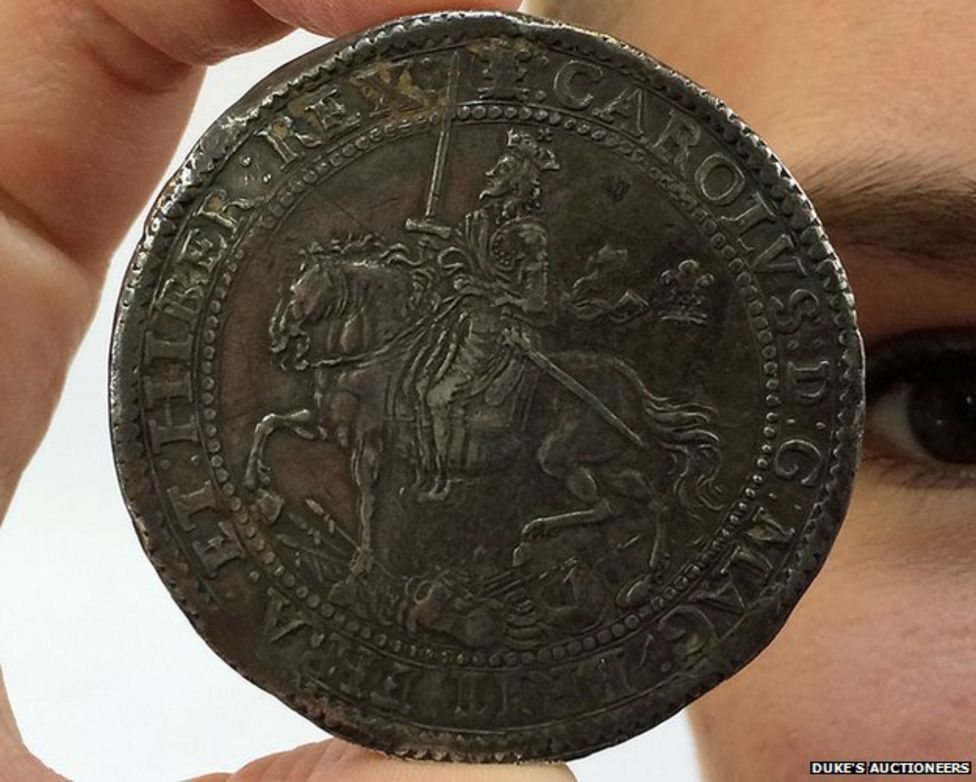 who was still a minor when it was written. The reason for the largess to a teenager is not specified, but its all in cash.
Joseph inherited the estate of an English Lord as a young man less than 18 months before he had to run for it, then he
vanishes from British Records without a trace. There are No marriage, birth or death records and no Land Deeds.
(Credit:Troy Bennett Bangor Daily News). The only known written records (using his given name) of his life
so far are the multiple references in Lord Pride's will, which is an official document of Parliment. The rest of the family
is reported in Poverty in England in 1662.
who was still a minor when it was written. The reason for the largess to a teenager is not specified, but its all in cash.
Joseph inherited the estate of an English Lord as a young man less than 18 months before he had to run for it, then he
vanishes from British Records without a trace. There are No marriage, birth or death records and no Land Deeds.
(Credit:Troy Bennett Bangor Daily News). The only known written records (using his given name) of his life
so far are the multiple references in Lord Pride's will, which is an official document of Parliment. The rest of the family
is reported in Poverty in England in 1662.
Joseph Pride, a rich young man of London, hid in the Maine wilderness for 50 years, using an alias, until his death in 1710, while the King of England and the entire British Empire sought him to kill him. He finally emerged to baptize the six children he,... alias John,... and Jane Pride successfully raised on the shores of Highland Lake in Falmouth Maine. They traveled with six children all under 12 years old, on empty winter roads and seas, avoiding the Red Coats, to the First Church in Beverly Mass Dec 12, 1686, one year after his persuer Charles 2nd had died, and the fury of the hunt had lessened.
The baptizims of the first church are overwhelmingly single baptisms, with the occasional double. But the family of alias John and Jane Pride are all registered the same day proving this family of six Pride children were coming from a great distance for baptisms that were greatly delayed in 1686. If not Prides Corner then from where? There simply are no other candidates, no other concentrations of the Pride name pre 1776 save Beverly itself. Why such an extreme delay in a puritan family risking eternal damnation for the children? Dying without Baptism was a very serious matter in the puritan world. Did the death of his persuer Charles 2nd the year before finally reduce the intensity of the search enough to finally allow the baptisms?
On April 12, 1726 Joseph and Sarah Pride had a son Joseph born in Falmouth. The Joseph born in 1726, the executioner's grandson, would go on to become Captain Joseph Pride in George Washington's Continental Navy where he served with his oldest son Joseph Pride (Thomas, Joseph, Joseph, Joseph's, Joseph), and with his younger sons John, Peter and... (Colonel Thomas Prides great great grandson) ... Thomas.
True to the legend, the Pride Family lineage, is one first born Joseph Pride after another, every generation across THREE centuries. There is a living first born Joseph in his honor in every Falmouth (later Westbrook), Maine census up to 1900 (see Ancestry.com links below). It is the Pride family's silent testimony to its history, the only safe testimony possible for such a hunted figure at first, and as centuries passed,... for a forgotten one. The 1790 Census for Falmouth, Maine for example lists William, John, Henry, Joseph, and a second Joseph, a Joseph for each generation, (1822)
Falmouths 1820 census also gives a tantalizing glimpse into the family secret. Every single name listed is a Lord Pride family Name. Multiple second born Thomas, William, John, Samuel and Henry Pride's occurring over the years are noted. They are the same Family Names throughout the years of first born Josephs. Lord Thomas Pride's sons were Thomas, William, John, Samuel and Joseph, daughter Elizabeth and uncle Henry. This puritan revolutionary family's determination to leave a mark over multiple generations of Joseph always first, not General, Grandee, and Knighted, Sir Thomas is a powerful statement of determination by multiple generations in multiple family branches.
First born Josephs in the Census
1637... 1790 1800 1810 1820 1830* 1840 1850 1860 1870 1880 1890 1900
Family Names in the Census
1637... 1790 1800 1810 1820 1830 1840 1850 1860 1870 1880 1890 1900
The Executioner's son Joseph appears numerous times in the very earliest Falmouth Town Records beginning with an Animal Brand registration on 1/20/1726. A Proprietors Grant of 104 acres North West of the Presumpscott (Westbrook) to Joseph Pride is referenced in many later deeds and news articles, but a copy of the 1734 grant itself is elusive so far. However the parcel, abutting Prides Bridge, the start of original Masting Road, had no neighbors for years then rapidly adds deeds in all directions. It may represent a reoccupation of the riverside camp of the masting effort, the bottom of the road to the Lake (302) and the really big trees. The Prides continuously occupy the area from the very first records for several centuries thereafter. Prides Bridge (at 302) across the Presumscott appears sometime in the mid 1740s. Prides are buried throughout the area with some of its oldest gravestones.
Joseph Pride's initial refuge in Prides Corner was no accident and it was not random. His father Lord Pride had become fabulously wealthy as a supplier of lumber and building materials used to build the British Fleet and the beer, victuals and supplies to sustain it throughout the 1650's. Lord Pride, a civil war General of soldiers of foot (the third highest ranking one by the end of the war), was so central to the British Navy Establishment that he was to be named Commander of the Entire Fleet if Admiral Blake had not survived the fever in 1653. In 1649, the year of the execution, he purchased the entire Nunsuch Forest and its Manor House south of London for shipbuilding materials for the fleet, and immediately stripped it of 6000 trees in a few years. Its profits went to pay his men for thier past service in the war, after Parliment stiffed them. Then in 1652, just as they finished harvesting Nunsuch Forest, the dutch navy destroyed the masts of the British Navy with their new weapon,... chain shot, creating an unprecedented crisis for the British Empire. No Masts, no Warships,... no Warships no British Empire.
For the first time ever the Admiralty launched an organized masting expedition in 1652 using hastily converted Navy Ships to meet the emergency. In those years Lord Pride functioned as the Supply Master for the Navy. The men he had led and trusted thru ten years of war were there (with just the right skill set) to meet the need and save the empire. Evidence suggests it was Lord Pride's Nunsuch crew of puritan civil war veterans,... now an organized, trained, highly skilled, equipped and available lumberjack crew,... already working for the Navy, that began the harvest of Duck Ponds old growth in the 1650's and built the abandoned logging camp that Joseph fled to in 1661. Next door to the Presumpscott, the Nonesuch river in Scarborough, an area historically noted as mast rich, is named for Nunsuch Forest. The Nunsuch Estate was Lord Pride's Family home during the 1650's when these rivers were being Masted. It appears Lord Prides veterans named one of the richest masting sites in America for the quiet english forest where they recovered from the War, got paid, and grew into highly skilled and specialized naval Lumberjacks, where they traded the screams and horrors of medieval war for the sounds of chirping birds.
The Admiralties Masting crews returned every year for a decade before the Mast Agent system began, systematically harvesting the best and easiest sites. They were the first organized, systematic crews to Mast, and they got the best of it before anybody else could. It put the British Navy on top for decades.
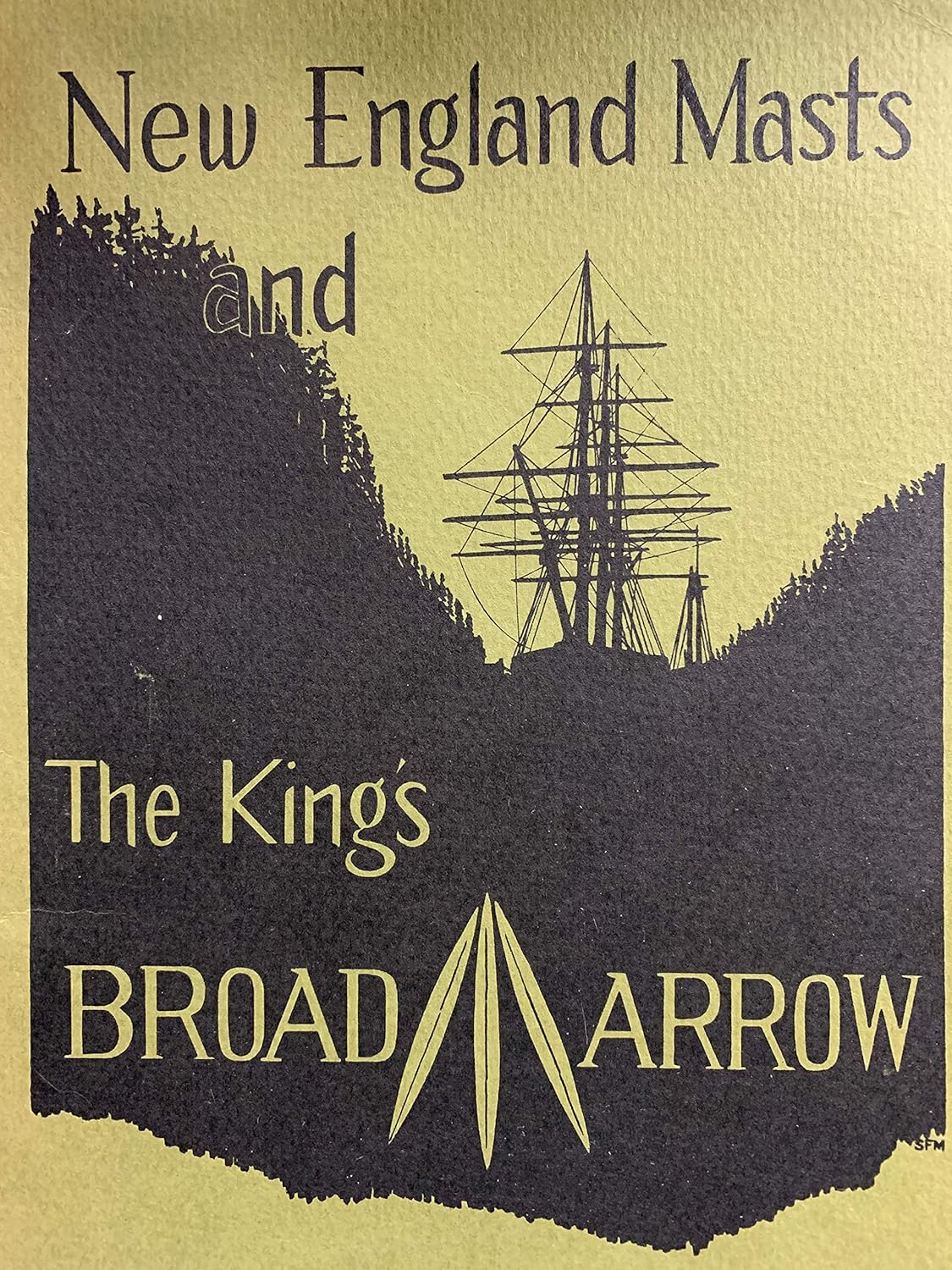 Highland Lake Masting created safe (from the crown anyway), extremely remote, cleared land for farming, functional transport
both out for lumber and masts and in for supplies. Masting was done in winter and would require
wells to water the animals and work crews involved, hovels for the Oxen, and thrown up lodgings for the crew.
The history of the Masting industry makes it clear,
this area was already masted and vacant by 1661, and evidently masted by people the fugitive Joseph would
have known his entire life.
He spent his teenage years, after the execution, on the Nonsuch Estate
while it was being logged by his father's veterans. One can only imagine the relationship that would have developed
between the veterans of the grizzly war against the vile and hated King, and the teenager who did him in.
In 1661 the masting area was a few cleared acres (a 'turning square') miles deep in virgin forest, accessible only by a 3 mile logging path (route 302 today)
to the uppermost navigable part of a small river with no traffic and two waterfalls, the Presumpscott,
but it may have come with an established support system of life long friends. Friends whose oaths and secrets, forged in a brutal civil war,
would all go to the grave, and in doing so would thwart the new King of England in his obsessive 25 year hunt to kill Joseph Pride.
Highland Lake Masting created safe (from the crown anyway), extremely remote, cleared land for farming, functional transport
both out for lumber and masts and in for supplies. Masting was done in winter and would require
wells to water the animals and work crews involved, hovels for the Oxen, and thrown up lodgings for the crew.
The history of the Masting industry makes it clear,
this area was already masted and vacant by 1661, and evidently masted by people the fugitive Joseph would
have known his entire life.
He spent his teenage years, after the execution, on the Nonsuch Estate
while it was being logged by his father's veterans. One can only imagine the relationship that would have developed
between the veterans of the grizzly war against the vile and hated King, and the teenager who did him in.
In 1661 the masting area was a few cleared acres (a 'turning square') miles deep in virgin forest, accessible only by a 3 mile logging path (route 302 today)
to the uppermost navigable part of a small river with no traffic and two waterfalls, the Presumpscott,
but it may have come with an established support system of life long friends. Friends whose oaths and secrets, forged in a brutal civil war,
would all go to the grave, and in doing so would thwart the new King of England in his obsessive 25 year hunt to kill Joseph Pride.
The entire issue of the initial events once in America, is of course clouded and confused by the fugitive status under pain of death which discouraged accurate regicide identifying documentation in the strongest possible manner. During the American Revolution in 1776, Redcoats would regularly walk hundreds of miles just to spit on the gravestone of Regicide John Dixwell who died in 1689.
Alias John Pride married Jane Lovering of Sheepscot Maine during King Philips War in 1675, when Indians were killing colonists all over the east coast, especially in Maine. Mutual hosility accelerated throughout 1674 leading up to the Falmouth massacres in 1675. Alias John Pride took the oath for Freeman Status in 1674. Massachusetts Freeman Records list the oath as taken at Pemaquid, Maine as does the Beverly Marriage listing. The Pemaquid Court summoned area residents to take the Oath. 'John' Pride's name appears with the Jurymen appointed for the process (Humphries to Cole). He is listed as the Juryman for Damariscove, a 200 acre Island 6 miles offshore.
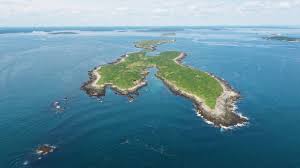
Damariscove Island
Down East would have been Joseph's only option to flee the growing indian troubles in Falmouth, when English settlers
gossip was even more dangerous to him than the Indians.
When your isolated farm hidden miles deep in dense woods becomes too dangerous,... and civilization is even more dangerous,
a remote tiny island just down the coast would have been the only available safe direction. As the war got Worse
the Entire Maine Coastal population fled
 for Beverly en-mass, where
in all the confusion, alias 'John' married fellow refugee Jane Lovering of Sheepscot Maine in 1675.
for Beverly en-mass, where
in all the confusion, alias 'John' married fellow refugee Jane Lovering of Sheepscot Maine in 1675.
The Crown deposed Jane Lovering's niece and others about alias John Pride in 1737, 88 years after the execution, in multiple jurisdictions. Underwoods deposition only targeted John Pride. Alias John Pride never owned property. He would have been 100 years old in 1737. Multiple Majesties were involved in the investigation, The investigation was ostensibly over real estate titles as was common at this time, but the depositions seem a little off. He was the most wanted man in the world. Adding to the confusion, the Crown's hunt itself, was a government secret. The citations are comments that mysteriously appear in original Deeds from both Suffolk (18:253) and York County records (Vol XVIII), that were accidentally picked up in the massive document searches by the authoritative reference work "The Great Migration". There may be more of them outside its 1620-1640 primary search parameters (for root individuals) yet to be discovered.
Lord Pride's son John died at birth in 1630. He was the Executioner's older brother. John Pride of Beverly (Prides Crossing) who died in 1647 was Lord Pride's nephew, the executioner's cousin. Joseph is the only offspring of Lord Pride whose life is unaccounted for. The history in England of all the other offspring is known. They all died in England leaving no Pride lineage. Pride was a very rare last name in both Old and New England. There were only 12 Prides (including children and wives) before 1700 in New England, and only 50 Prides existed in 1675 in all of England. The Pride name was so unique and rare that the years 1604, 1606, 1620, 1642, and 1657 had zero Prides born in England. The name itself means 'rare or precious' in Welch. The year 1675 has one too many Johns and is missing any reference to a Joseph anywhere, not to mention his verified millions. The extra John, church-going Pemaquid John, the husband of Jane (of Pemaquid), and father of six long lived baptized children is Joseph. That's why we get three centuries of First Born Josephs in the Prides Corner Prides. The executioners son started it. Joseph the son had three first born Josephs before he got a survivor in 1726 (Captain Joseph) (S-J).
Both Lord Pride and his nephew were members of Rev Duppa's Jacob Church in London in the 1630s. When Charle's Archbishop, William Laud, attacked the church, imprisoning its members in 1632, and started cutting off puritan's ears, John fled to Beverly. He was the first Pride to flee the King to the new world and start a family, but not the last. As a member of the Duppa congregation, John was a puritan heretic living in Beverly's strict puritan world. The Duppa Congregation was hated by London Anglicans (Archbishop Laud) and Beverly Puritans alike. Duppa beliefs were too puritan for the Anglicans, and too anglican for the Puritans. They endorsed freedom of conscience in Religion and were hated by both Authoritarian groups even more so than they hated each other. His confrontations with his neighbors were frequent, bitter and petty. He does not appear in Beverly Church Records, he lived several miles removed from the town. John Fled Archbishop Laud when he started cutting off puritan ears for hearing unapproved sermons, right into one of the most intolerant communities in history. Others fled the beverly puritans, even to indian territories in Maine, but he stood his ground and the less diligent of researchers regard him as a "bad guy" for it. He appears to be a man of principle who should be honored for it. For poor ole John it would have been worse than wearing a Trump hat in North Windham.
The Beverly Prides descendents were John-John-Peter (+2 dau). The only heir of Beverly Johns 1731 Will is Peter. The Executioner also had a son named Peter, but Peter does not appear as one of Lord Prides children. Only One Peter Pride is recorded all of England before 1675. He died in 1603, suggesting he was the great grand father of both.
Surviving King Williams war may have been more a matter of luck than good timing. King Williams war was a series of targeted military surprise attacks by Joint French and Indian forces against targets like Fort Loyal in Falmouth (todays Portland) in 1690. The 200 indians attacking Ft Loyal were Norridgewok and Canadian from a long distance away, not local. A Sherman style scortched earth campaign against random settlers may have occurred as targets of opportunity but the local Indian Population was much reduced by this time. the masting area was only 8 miles from Fort Loyal, but it was 8 miles of uninterupted dense Forest that hid it, and that may have been enough, the Fort Loyal attack came by sea.
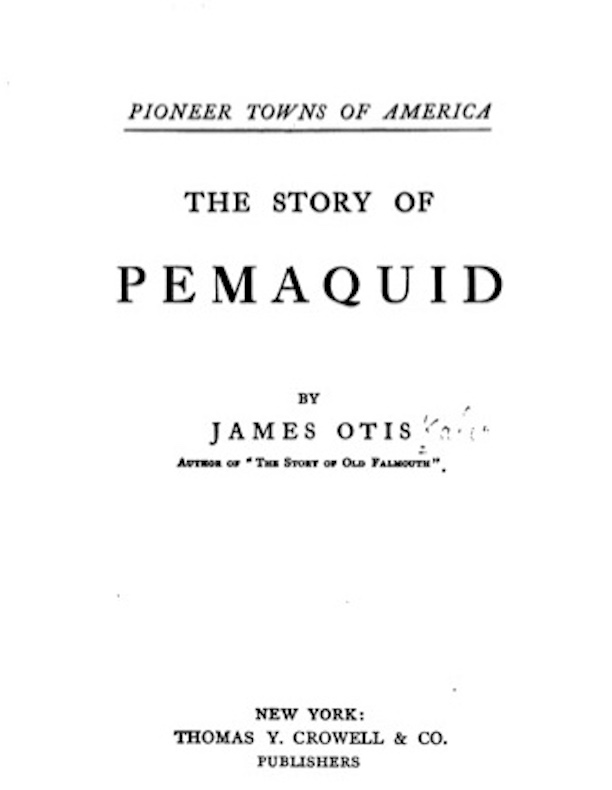
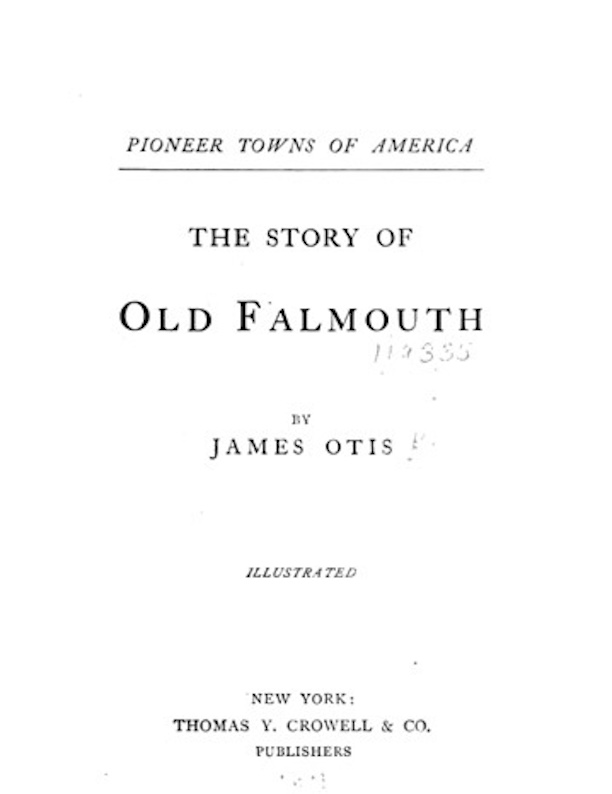
As the indian threat subsided, the Prides at some point returned to Maine for safety from the Crown. A crown with less to do was much more of a threat. The masting area by 1676 was the result of a large masting crews efforts, the help and materials he got/brought initally (he was rich) and 14 years of his labor. It would have been a perfect fugitive nest to settle into and raise a family. The area at that time, was depopulated of any British loyalists that would hang him, as well as any local indians who would kill him. His enemies had all gone to war and he was the only victor. He survived the crowns never ending world wide search because of the Indian wars. No records were kept locally for 50 more years, until the 1720's. But the children left deeds, grants, a brand registration, birth notices and news articles. The same family names, including Jane begin to appear only in Maine records, and they appear in volume right at the start with the first census and regular records (see ancestry links below).
In 1710 the last of the First Generation moves south, out of the wilderness, possibly indicating the death of the executioner that year (age 73). William baptizes his first four children born in 1699-1701-03-07 in Beverly on Dec 18, 1709, then the last three are baptized normally, each one soon after birth in 1711-13-16. He dies in 1751 in Norwich Conneticut near his wifes family. Peter baptises both Jonathan (1702) and Hannah (1704) in Beverly Aug 13, 1710 and becomes a resident of the town dying there in 1743. The executioners son Joseph is the first son to leave the nest for Beverly, marrying Elizabeth Bond in 1702 his children are baptized as born in 1703 06 07. Joseph, perhaps the odd man out, relocates to Gloucester in 1710, and then returns to Falmouth after his wife Elizabeth Bond dies in 1716. All Maine Prides are thought to descend from him and his second wife Sarah from Gloucester 1721. Jane, the family matriarch, appears to leave the wilderness around the same time, dying in Beverly in 1713 as "Goodwife" Pride. There is no record of Alias John Prides death. "Goodwife" is the only other mystery Pride in the records of the time, all others are accounted for and documented.
Mary, designated the second oldest in the Baptisim records, leaves the wilderness first marrying John Lovett in Beverly in 1695 . The executioners youngest daughter, Elizabeth, goes next declaring an "Intention to Marry" in Beverly, the first Pride to do so (already living there?) on May 21, 1698 and then weds Beverly resident Lot Conant three weeks later on, June 14, 1698. Women were both more at risk and of less use in the totally depopulated wilderness that followed King Williams war. John dissappears from records after 1686 either dying early or staying in Falmouth where no records were kept. The others seem to have fled the uninhabited wilderness for the bright lights of Beverly at the earliest opportunity, who could blame them.
Somewhat conclusively,...given Ancestry.com's level of comprehensiveness...Neither alias John nor Joseph is listed on any passenger list (because he swam for it !). There is only one immigration record for last name Pride between 1600 and 1700 to New England. John Pride, 1637, Salem, Massachusetts who died in 1647 leaving the absolutely letter perfect Cover Name to have if the absolute top priority of the King of England and the entire British Empire for 50 years is to mount your head on a spike.
Fortunately for history, Puritan New England seems to have gotten married and baptized in the First Church of Beverly Massachusetts until 1710. The names of all six baptized Children show up repeatedly in the Pre-Civil War Maine census records ( John William Peter Joseph Mary Elizabeth ) while only Peter shows up in the Beverly Essex pre-civil War census records. ( John William Peter Joseph Mary Elizabeth ) In powerful support for the winter baptisim pilgrimage with six small children all under 12 years old, the name Jane Pride, for the formerly Jane Lovering, also shows up repeatedly in Falmouth (later Westbrook), Maine. My favorite is Mary Jane Pride combining the Executioner's daughter and wifes names in a "smokey concoction" in 1828.
Genealogists all over the place are mistaking ceremonies performed at the First Church as residency which it is clearly not. Available data indicates that the number baptized before 1710 was triple or greater than the entire population of Beverly in 1710. With Marriges, Funerals and Holidays thrown in,... The First Church must have been a very busy place ! See: First Church records Analyzer Research Ongoing and the awesome earth shaking Ancestry.com is still updating and expanding.
When Joseph Arrived in 1661 in this area, it was Mast road or nothing and the turning squares would have been the only open areas, areas surrounded by mountains of old dead wood and miles of dense forest. The area remained wilderness until 1761. It was indian territory with no obvious advantages for settlement for anyone but a fugitive before 1761. Even those advantages would have quickly dissappeared if the land had not been worked and had reverted to wilderness. Turning squares that were occupied and worked became the town squares, but most of them rapidly vanished into the wilderness. The Purintons built where they built for a reason, they had a neighbor, and the road to the river had 100 years of use by 1761. Without that use by the Pride family there would have been no road, it would have dissappeared into the wilderness like most of them did. Unworked land and roads dissappear in about 25 years. By 1761 the masting area was a square cut out of dense forest, 8 Miles from anything, accessible only via a 3 mile logging path leading to the last navigable upper portion of a small river with no traffic, and two waterfalls, the Presumpscot. The Purintons choice of location in 1761, can not be explained without the Prides prior occupation, to say nothing of their pre-1753 bridge, called "Prides Bridge".
Joseph's cabin was depicted on an early 1700's painted plate that always hung prominently over our Kitchen table until 1968. The painted plate was handed down through the generations, along with the story, and is missing today. The fired clay plate was fractured into one inch square pieces in 1968 by me in a violent fight with my brother (the first one I won :), then meticulously reconstructed with a dark clay bonder. Its colors are predominantly yellow and blue/green.

Prides Corner is a Place
In 1968 two hunters from Windham Maine found a Fifty pound lump of half melted british civil war era silver coins in Suckfish Brook in the 1960's (near to Pride Farm Road). It was the talk of the town for years. The seven Windham senior citizens in the video below all vividly remember the event. I remember family conversations about this as a teenager. I can remember puzzled conversations about where it had come from and speculation if it was pirate loot, and why were they trying to melt it.
 (Watch 7 Witnesses Memories)
(Watch 7 Witnesses Memories)







As a 14 year old, I remember my father in family conversations with my sister describing the find as a half melted 50 pound
lump of old coins from "before anyone was supposed to be there",
and that they "were all dated a hundred years before there was anyone there". No knowledge of the will was known til a couple of years ago,
so my father never put it together with the silver found a mile away from Pride Farm, there was no obvious connection.
My father's 20 year business partner,
famous Harness Horse Driver Donnie Richards  , confirmed my father
personally knew the hunters, and told him about the event at the time.
Byron G Pride was a widely known, rigorously honest, highly respected, large scale lakefront Real Estate developer, 500 people stood throughout his
funeral because the seats were full. They lined the sidewalk 3 deep in front of the church throughout the service in a sign of respect.
You can hear the pride in the association and admiration in Donnie Richards voice.
The descriptions I overheard at age 14, were his own first hand observations and are thus, highly reliable descriptions.
, confirmed my father
personally knew the hunters, and told him about the event at the time.
Byron G Pride was a widely known, rigorously honest, highly respected, large scale lakefront Real Estate developer, 500 people stood throughout his
funeral because the seats were full. They lined the sidewalk 3 deep in front of the church throughout the service in a sign of respect.
You can hear the pride in the association and admiration in Donnie Richards voice.
The descriptions I overheard at age 14, were his own first hand observations and are thus, highly reliable descriptions.
One hunter Robert Munroe, deceased in 1978, has been identified, by his widow, who saw the coins, expanded interview video upcoming.
The find fits the unsuccessful attempt to melt the distinctive coins to a form he could use without alerting the crown to his
presence. He apparently failed and just buried the mess, then the Suckfish changed stream.
In the mid 1960s two Hunters looked down and there was this huge ball of silver just sitting there !
 Please contact the author if you have any information about this.
The 3700 remaining pounds sterling of the period specified in the will, would directly translate to 234 million dollars,
calculated using a 2015 Auction as a rare coin, (a billion in 2026?). All the same or
different types is unknown. But its a lot of money in any case.
Please contact the author if you have any information about this.
The 3700 remaining pounds sterling of the period specified in the will, would directly translate to 234 million dollars,
calculated using a 2015 Auction as a rare coin, (a billion in 2026?). All the same or
different types is unknown. But its a lot of money in any case.
Melting the coins seems most likely an act of desperation during the early years. Joseph would have been unable to spend the coins for himself or the cause, until well after the death of Charles 2nd in 1685. Circulating distinctive and uncommon Civil War minted silver would have lead the Redcoats to his door in short order in the small and confined colonial economy. The coins were always a mortal threat to him, not a source of wealth. After a lifetime hunted by the King, its possible he never even told his kids.
William and Hannah declare an intention to Marry on July 22, 1699, She Gives birth to John two months later Sept 3, 1699 (Nine months after Christmas-see Residence Date listed as 1709), then Dec 26, 1700 the day after the next christmas, they are both convicted of fornication before marriage. William appears alone ("alledging his wife is sick" or was it no winter travel for 3 month old John ?) avoiding any mention of information that could expose his father, he states they are now married but no marriage is recorded in Beverly (falmouth?). John is finally baptised in beverly along with the William, Herbert and Sarah in 1709. Tradewind sailing schedules generally arrived between mid winter and spring, making christmas a part of the 'safe' period (June-Febuary) when they would have known who was in town. Sailing Falmouth to Beverly would have been a one day trip each way. Costal fishing likely provided a communications link of sorts with the Prides of Beverly in the earliest years.
Of the twelve regicides who fled England in the spring of 1660, the fate of three in the US is officially known. Geoffe, Whaley and Dixwell were actively hunted in various episodes until 1689 throughout Massachusetts and New Haven (some 40 years later). One attempt included a contingent of 450 British Redcoats. They escaped with the assistance of widespread puritan support. In a very real sense the American Revolution was simply a continuation of the British Civil War on new ground. They eventually found safety in the wilderness in western Massachusetts just beyond the western edge of civilization, far away from towns and possible gossip, and survived.
Given the decades long world wide campaign to execute the Regicides and the level of settlement in the area around presumpscot river falls in the 1660's, its location, just beyond the northern edge of civilization, far away from towns and possible gossip, actually makes sense if you don't want to get hung drawn and quartered. It was the same solution as the others, just a different direction, 100 miles north of Boston instead of 100 miles west.
It is fascinating to note the pervasive influence in the Prides Corner, area of the British Civil War and the Puritans. Falmouth Maine was named for the Battle of Falmouth in 1646 and the rolls of the New Model Army that fought there read like the town registers. Levolor names predominate, I am proud to say. A Rainsborough cut my hair as a child, another was my teacher, as was Mr Graves, a Winslow trained my father's race horses, and a Richards drove them, our neighbors... Frye, Moody, Potter, Butler and Bailey. The list of New Model Army names that matched my childhood was stunning. I can imagine how strong the mythology must have been through the revolutionary war years and much later. The ongoing puritan character of the area would go far to explaining the second century of Josephs and the uniquely puritan twist of private pride and public shunning on a topic like Regicide and Execution in the family tree (especially without proof). Even as late as the 1950's Oliver Cromwell was oft quoted in my family circles. "Warts and All" was a common favorite.
At the heart of every puritan family is the family bible, listing ancestors back as far as possible on the inside cover and front pages. Puritan Bibles were made with a half a dozen blank front cover pages special for the purpose. I saw a Pride family bible once (whereabouts unknown) that went back to 1820s. Every line a different handwriting (Quill to Iron to Ballpoint as I recall). Puritan Bibles were where you went to consider names for your expected (my sister was). It was often a family affair with the expectant mother asking questions about the name choices listed and learning her husbands family history. Both Thomas and Samuel reappear in the Falmouth census of 1800, Elizabeth pops up in 1850. That's everybody,... just in case there was any doubt who this family really is :)
My Grandmother's (Inez Pride) irritation with author John Lewis and his book "The Early History of Prides Corner" ignoring her claims, caused her to shake her finger at my father and insist he tell me the story in the fall of 1968. Byron Pride (my father) was a skeptic, likely influenced by new knowlege of the "official massachusets birth record" that seemed to refute everything for decades til it finally revealed all with the baptism records. He said everybody's been claiming this since day one, I am supposed to tell you so... and afterward shrugged and says who really knows, but with a smile added "heck of a good story tho." I heartily agreed, I was as you can imagine floored. He also dutifully told me to tell my kids and to tell them to tell theirs. Despite his doubts, when he added that there was a deep seriousness in his demeanor unlike anything else I ever witnessed from this honorable citizen, community leader and all round wonderful human being. My dad. It made the impression he intended. In response to my specific query he traced his sources back as far as his grandfather Byron Pride born in 1847 (pictured above - note the distinctly puritan appearance), his father Merritt born in 1888, and several others whose names I did not recognize, long dead by the fall of 1968. My Grandfather Merritt, who was still living the year I was passed the baton, was alive during the life of the last First Born Joseph in our branch.
The three great turning points in Mankinds long progress toward democracy are the Magna Carta, the Execution of Charles 1st, and the Declaration of Independence. Their relative importance can be debated in each case. In only one was it accomplished by just one single individual representing the will of the nation. It is the purpose of the site to reveal history but also to mark it. A reconstruction of Josephs cabin recorded on an early 1700's hand painted plate and a state of Maine holiday on Dec 12, to mark these events here in our midst seems appropriate. A Holiday to celebrate one brave resourceful mans final victory over monstrous Tyranny in the form of six baptisims. Highland lake should really be renamed "Josephs Lake" to note the huge role it played in world history. It was his refuge, his water, and his food source, it protected him from the Kings Vengence
*Contemporary accounts reveal any levolor would have seemingly gladly hefted the axe,... so the statement is a sore thumb for all to see on its face. I am of the opinion, awaiting evidence, a universal decline (except for Joseph) probably did happen, almost would have had too, bumping it into the supernatural realm for its participants anyway, leading to the 40 and phrasing of its result. But the religious, spiritual and moral aspects of the decision which is being noted here are difficult to discern. Did Cromwell, upon finding no volunteers, initiate a survey of 40 ? (shame shame Oliver,... tho shalt not test...). Worse possibility, did he ask none or reject all, and sponsor adolescent murder to use in the manufacture of allegory to support his contention that he lead the second army of the living God ? Of course, it also could have been 40 arrived at without guile, which almost certainly would have lead to the same result by the power of its allegory alone. Its not a number a puritan would have missed under the circumstances.
Recently this article is getting support from several authoritative sources. The following is a recent post from the Author of "In the Name of the Crown" which was a published work about the flight of the regicides.
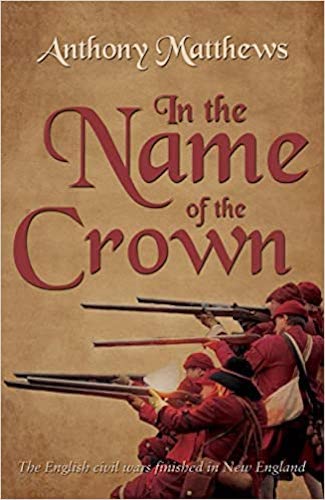
| 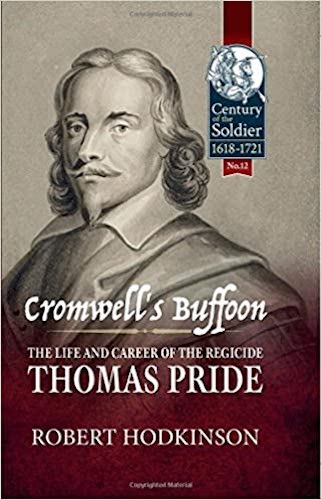
|
The title of Cromwells Buffon is a play on the characterizations of the bitter Royalists in the centuries that followed. It is typical ruling class derision without foundation on display. Sir Thomas Pride, as the text makes clear, was the opposite of the royalist characterization in every respect. He was a successful and incredibly capable individual, one who was obstinately independent to the point of opposing Cromwell as a virtual equal on important occasions. He is credited as blocking Oliver Cromwell from accepting the title of King in 1657. In what became a common english jest of the period for blunt speaking, he gave Cromwell "Colonel Pride's Common Council". He looked him in the eye and said so many had died to end Kingships that he would "shoot him in the head at the first opportunity if he acccepted". It was not in jest, Lord Pride was a Jarhead's Jarhead, a frontline officer who lead elite troops in savage hand to hand combat. Cromwell, who was about to accept it, declined the offer that afternoon. He was active in civic life, a leading london businessman in the decade before the war, a senior leader in the New Model Army ( a "Grandee"), a central figure in building the British Fleet, and a forceful medical reformer in the post war years pioneering PTSD treatment for his soldiers as inspector of both of Londons military hospitals and governor of St Bartholomews hospital in London. He became a leader of charitable agencies for aging soldiers and the poor in his senior years.
In the 1630's he was a prosperous small business man in bustling London as a brewer of beer. When the Kings oppression included a policy dictating religion, he began weekend training for soldier skills one hour a week, and became a leader of a "trained band" of about 100 fellow London tradesmen. Then the Kings Archbishop started cutting off the ears of fellow puritans who refused to hear instruction in the proper lessons of God.
One year after "weekend warrior" training began, he was a front line officer under Essex. He and his fellow london tradesmen fought many battles against professional Royalist Cavaliers, including the bloody 1st and 2nd battles of Newbury (with 50% combined casualties). He was in command of a regiment at the wars turning point, the decisive battle of Naseby under Fairfax in 1645. At wars end he accompanied Cromwell north to final victory as the commander of a brigade of three regiments at the battle of Preston in August 1648 (commanding the entire right wing).
After the war, the arrest of Parliment, and the execution the King, he focused on getting his troops the wages they were promised while Parliment continued to stiff them. He demanded a royal estate that had been siezed, and he put the organization he built to work harvesting an entire forest to build ships for the expanding Navy and get his soldiers thier past due wages. This began a second career as a manager of supplies for the Navy. In 1653, when Admiral Blake nearly died of the fever, Lord Pride, a leader of divisions of foot, was to become Commander of the British Navy, but the Admiral survived. Lord Pride helped build and run a good part of British Fleet,... and he almost got to command the British Fleet in battle in person. After the war, To the sound of screeching Royalist derision, he closed the Bear Pit at Southwark, where savage packs of dogs killed tied up bears, tearing them to pieces solely for the entertainment of fancily dressed Cavaliers. His reasons were a sophisticated and poignant lesson in Morality that escaped the Royalists entirely and that most of the world today would not readily grasp.
The crowns near erasure of this giant of the times, Lord Thomas Pride, from history is a powerful lesson for today, as we watch a very similar process working on the memory of JFK. The very first book ever written about Lord Pride was written in 2017. Proof I think, that there is more to the crowns dark influence to this day than is commonly believed.
Thomas Pride changed the world forever for the better with his actions.
This Giant of History single handedly, apparently by his own decision, changed the entire sweep of British History and the history of the
Western World with Prides Purge and abolished absolute monarchy for us all.
Right Man, Right Place, Right Time.
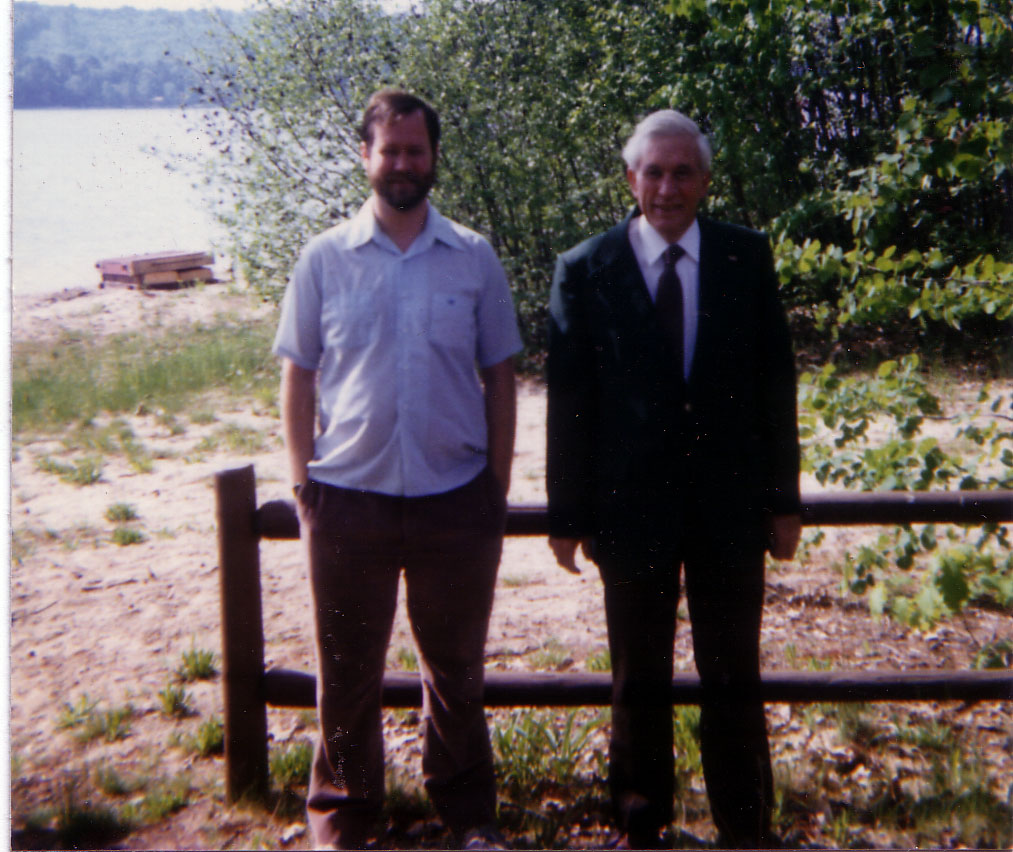
by Dan Pride
6th Great Grandson of Joseph Pride
Lord Thomas Pride Unknown
Joseph Pride 1637 (Executioner)
Joseph Pride 1686
Capt Joseph Pride 1726
John Pride 1762
David Pride 1812
Byron Pride 1847
Merritt Pride 1888
Byron Pride 1921
Daniel Pride 1952
Compare the Animal Brand Described in Josephs 1726 Brand Registration in Falmouth to see if its the same as Lord Pride used in England.
Identify the instigator of the multiple depositions in 1737, and connections of any individuals named in the documents. More details would be useful here.
Investigate reported irregularities in 1674 Freemen assignments, origination points and origination jurymen or majistrates characteristics. I noticed other Jurymen seemed to appear twice except John Pride in the list but my list is incomplete. First move flee to family, oops get transported to the nether isles with the paperwork for the everpresent and dominant navy there, yikes run from the indians ?
Is there a connection between the stunning prevelance of New Model Army surnames in the falmouth area and Lord Pride's Masting Crews in the 1650's. A statistical comparison of new model army names with the names in falmouth town records book one, might do to the trick. The Names appear to be predominately levelor. While Lord Pride was definately not a levelor, politically he was a fellow travelor and they dominated the ranks under him.
Parlimentary records reportedly contained many of the original Masting Work orders when Cambridge Universities classic "Forests and Seapower" was written in 1926, do they still exist for Duck Pond? or did the Luftwaffe get them. How much longer must we wait for text searchable naval and masting records ?
Identifying the Ship and Harbor should be easy now we know an approximate date and reviewing all voyage documents for previously missed or misunderstood information. The ship could have been a Naval Vessel, not yet on board with the transition.
Reviewing British Civil War documents for same
Review Beverly "Last will and testaments as well as Deeds from Beverly to 1750 as soon as the typeset versions become available. Parchements have proved too difficult.
Find a New England Weather Report from Dec 12, 1686
Trace the wearabouts of Naval Vessels during the transition to Charles 2nd.
Survey Coin dealers for any historic unusual activity in 17th century British Pounds
Researching this amazing woman Jane Lovering who followed the puritan hero into the Wilderness in the years following widespread massacres by the Maine Indians?
Detailed examination of the baptisim geographic patterns of the First Church, how common were long baptisim pilgrimages?
Reviewing documents and the culture and beliefs of the First Church.
Reviewing new model army records related to the Units commanded by Thomas Pride during the second civil war.
I will be traveling to London for research and meetings in the New Year and would be delighted to conspire with any interested parties DanPride@Gmail.com
James and Rose Pride arrive in Falmouth from Liverpool England aboard the Nestorian in 1867 implying 200 year transatlantic family connections existed.
Statistically analyse the incidence of births named Joseph both before and after the execution to discover if in fact knowledge was (as is suspected) widespread in the puritan community and has been suppressed somehow by the crown. and if true to determine how such a thing could be accomplished. The history of Rewriting of history may be a fascinating history lesson for the world. To understand Josephs status in puritan circles, imagine there was a successful assasin of Hitler and we are talking about him in jewish circles. Charles killed a larger percentage of Britains with his absurd wars than Hitler did. Despite the absurd Royalist depictions, Charles 1st was a small weak man, who didn't speak til he was three, then stuttered all his life but insisted he was all powerful over everyone. He was a cuckold (Charles 2nd was the result of his wifes affair with Henry Jermyn) with a wife who openly expressed distain for his manhood during crisis. He was rumored to have been intimate with his father's favorite object, Lord Buckingham (as in Bucking the Ham). He was a totally arrogant fool whose foolishness killed multitudes without one iota of remorse. No one was ever more justly beheaded.
Any contributors will be fully credited in all works, contact author link above
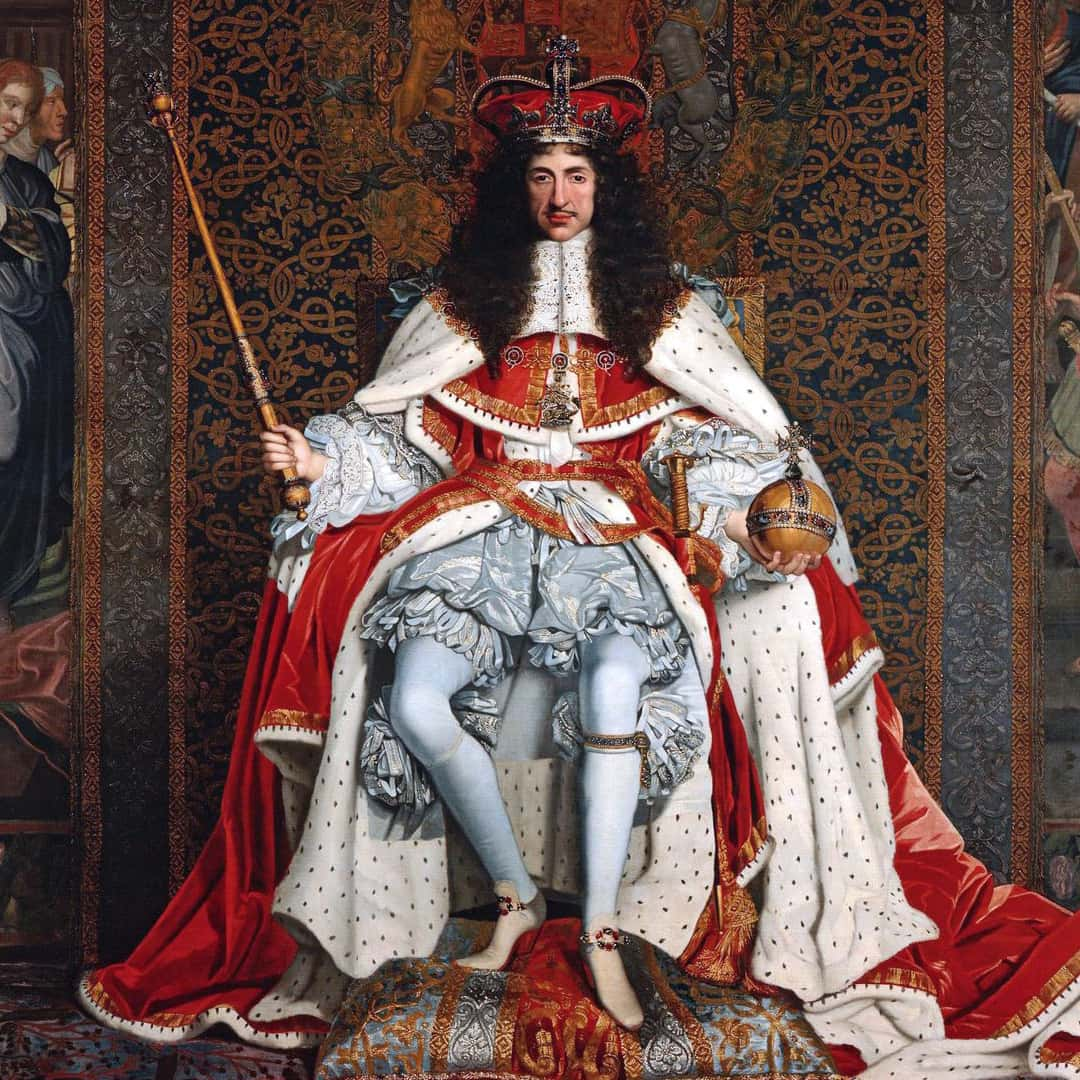
It cracks me up to see the image of Charles 2nd in full regailia with septer and all. With the pantaloons that part for easy access, so rudely displayed. Can you imagine having this guy dedicated to putting your head on a spike throughout his entire life,... for something you did when you were 12, and you defeat him and survive to raise a large family, with every single one baptized ! :)
All Pride Documents before 1800

See Pride Family Genetic History on 23andme.com and Ancestry.com
I want to Thank All the smart old guys down at the Westbrook Historical Society for their help going back to my first Census Records Search in the 1990's.